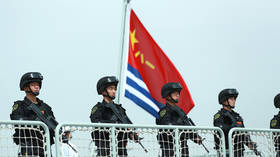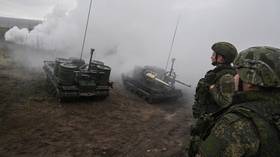Slow march to war: What happens after Pelosi’s Taiwan visit

At around 10pm Taipei time (2pm GMT), US House of Representatives Speaker Nancy Pelosi is expected to land in Taipei. Although she omitted the visit to the island from her public itinerary, insider US and Taiwan officials have since told the media that the trip is going ahead. Pelosi is expected to spend the night in Taipei and meet President Tsai Ing-wen the next day, before heading onwards to South Korea and Japan. Meanwhile, China has made it clear that the move constitutes a massive provocation, undermines the foundation of US-China relations, and would cause Beijing to retaliate. The US has since sought to turn the tables and frame China as the aggressor for threatening a response.
In the past few hours, China has begun to enact its reaction. Airspace in its Taiwan-adjacent province of Fujian has been closed. New sanctions have been tabled on Taipei in retaliation for being complicit in the visit, which have amounted to a sweeping ban on food exports from 100 companies, Chinese planes have crossed the “Median Line” of the Taiwan strait, and more military-based responses appear to be in store. However, one should be prudent to note that, for all the anxiety and uncertainty, this is not going to be a declaration of war or an invasion. China’s intention is to make a show of force and deterrence, to stake its position on the Taiwan issue, not to spark a catastrophe.
However, the danger does not lie in potentially destructive short-term reactions. Pelosi’s visit – the fact of it happening, not the substance of what she does in Taipei – will set the stage for further US-China confrontation in the long term. It isn’t worth going to war over Nancy Pelosi, and China with so much to potentially lose, isn’t that stupid. Still, the severity of this visit cannot be underestimated – it is not a one-off event, but adds to a long pattern of provocations from the US, which is actively aiming to undermine the legitimacy of the One China Policy.
This includes: Biden’s recent comments that the US would “defend” Taiwan, the US encouragement of Lithuania to open a “Taiwan representative office”, the scrubbing of references to the One China Policy from the State Department website, and of course Taipei’s own bid to invite as many Western politicians as possible to the island, including reportedly paying them spurious amounts of money, in a bid to oppose China and undermine possible reunification. All this time, Beijing has been watching and issuing progressively more severe warnings. Thus, Pelosi’s adventurism could become “the straw that broke the camel’s back.” It might be argued that her visit is a personal decision, but being the third most powerful individual in the US and the second in line to the presidency, Beijing sees her as a representative of Washington’s will, and cannot leave such a provocation unanswered.
China believes, based on all of the above, that the US is gradually eroding its public commitment to the “One China Policy” with underhand decisions which effectively move the goalposts (a tactic described as “salami slicing”) and weaken the legitimacy of China’s position. Therefore, Beijing is obligated to forcefully push back, meaning the more such provocations the US makes, the more tensions and risks increase as the middle ground collapses. Worse still, Taiwan’s leaders actively indulge in this behaviour because they perceive they can get away with it and that threats by Beijing are merely a bluff. They see this effort as creating a slow change towards a formally independent Taiwan, with China only able to rage at it from the sidelines.
This means that unless Beijing’s reaction – whatever it is – makes Washington rethink its behaviour, which if you look at the grander scheme of things appears extremely unlikely, the issue is going on a slow march to war. US foreign policy doctrine, as we see with Ukraine, is based on the premise that in order to maximise US advantages, America must not compromise at any cost and always must utilize the fulness of its capabilities in order to attain its unilateral preferences. We see this with Ukraine and NATO expansion, North Korea and denuclearization, Iran and the JCPOA, and of course China and Taiwan.
Ultra-hawks deride deals with adversaries as weakness and appeasement, meaning in this context, and especially with China being branded the biggest threat to the US, there is zero realistic chance of a compromise, and that is precisely why individuals such as Nancy Pelosi are acting in this way, to ensure there won’t be one. Thus, this visit is likely in many ways to be a turning point, but in the long term, as opposed to the short term. China will likely react with a show of force, one which is well planned out to avoid a “path of no return”, but what will disappoint Beijing is how little this will likely change in the grander scheme of things.
The statements, views and opinions expressed in this column are solely those of the author and do not necessarily represent those of RT.













